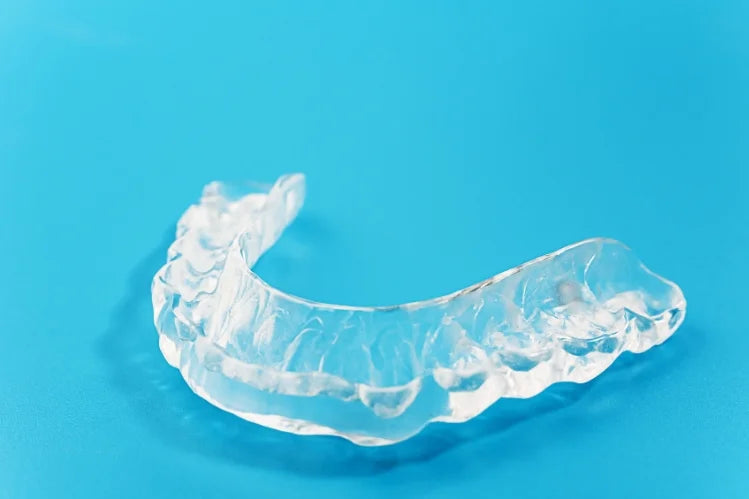
A night guard, also known as a dental guard, protects your teeth from grinding and clenching. It plays a keen role in preventing your teeth, however, if not maintained well it can become a breeding ground for bacteria. This blog will discuss what a night guard is and how it can cause bacterial growth if not maintained well. Moreover, there are certain expert-curated tips to clean your night guard.
What is a Night Guard?
A night guard is a dental device designed for people who suffer from bruxism or other temporomandibular joint (TMJ) disorders. Protecting your teeth from bruxism or teeth grinding is essential as it can further lead to enamel damage. Wearing a night guard can help to protect yourself from enamel damage caused by teeth grinding.
Benefits of wearing a Night Guard
A night guard is an essential orthodontic device that helps in various ways. Following are some of the benefits of wearing a night guard.
Protecting from Tooth damage
Consistent grinding can lead to tooth damage which can result in worn-down enamel, chipped teeth, or even fractures. A night guard works as a protective barrier between the upper and lower arch minimizing grinding.
Reduces Sensitivity Issues
Teeth grinding impacts the tooth enamel making it more prone to damage. Grinding can further wear down the enamel, exposing it more and making it sensitive. It further leads to sensitivity issues and discomfort from hot and cold food or beverages. However, a night guard can benefit you by protecting your teeth from sensitivity issues.
Reduce disruptions while sleeping
Teeth grinding sure leads to sleep disruptions. A night guard protects your teeth from grinding making it easier for you to have a sound sleep with fewer disruptions.
Why is it important to maintain a Night Guard?
Maintaining a Night Guard is essential to ensure good oral hygiene. If you do not take care of your night guard it can lead to the following.
Bad Breath
Having bacteria on your night guard can lead to bacterial accumulation causing a bad odor.
Germs
Skipping frequent cleaning of your dental devices can lead to the growth of bacteria.
Discoloration
If you do not keep your night guard clean, it can cause discoloration to your dental appliance.
Impacts Effectiveness
If you do not maintain your night guard, there is a high chance of it getting stained, producing bacteria, or even catching scratches. It can impact the whole purpose and effectiveness of your night guard.
Stress Reduction
Knowing that your teeth are protected can lower the levels of stress and anxiety. This helps in the overall well-being of an individual which further helps to improve sleep and quality of life.
How to clean a Night Guard?
1. Rinse
After using your night guard, it is essential to rinse it off with lukewarm water. This helps to remove the saliva accumulated overnight in the night guard or any bacteria. Avoid using extremely hot water as it can damage the product.
2. Brush
Use a soft-bristled brush to clean any of the remaining bacteria in the night guard. It is important to avoid hard bristled brush as it may cause scratches and damage to your night guard.
3. Store
It is important to store your night guard in its container to keep it safe from any damage and catch any germs. Moreover, use a ventilated container for it to pass air from your night guard.
Methods to Clean a Night Guard
It is essential to deep clean your night guard to maintain good oral hygiene.
Mouthwash
A mouthwash can be an effective way to clean your night guard. However, using a non-alcoholic mouthwash can help sanitize your night guard without causing any damage.
- Fill your glass with a mouthwash in a glass.
- Dip your night guard in it for at least 30 minutes.
- Rinse it afterward.
Toothpaste
Use a non-abrasive toothpaste to clean your night guard effectively. However, it must be kept in mind to use a soft-bristled brush for proper cleaning and to avoid damage to your appliance. Use the brush in slow circular motions for effective results.
Hydrogen Peroxide with Vinegar
Another method to clean your night guard is by using a mixture of hydrogen peroxide with vinegar. It is a cost-effective way to maintain your night guard. Fill a glass with the mixture and dip your dental guard for at least 30 minutes.
To conclude, a Night guard is an effective device to protect yourself from teeth grinding. To help one in various ways, however, it is essential to maintain your device for optimal results. Moreover, it is important to clean your night guard to prevent bacteria from entering your mouth. Different effective ways can be adopted to clean and maintain your night guard.
FAQs
1. What is the purpose of a Night Guard?
A night guard also known as a dental guard is designed for people with bruxism. It acts as a barrier between the upper and lower arch and prevents them from grinding.
2. What are the benefits of a Night Guard?
A night guard helps protect teeth from grinding by being a protective barrier between both arches. Further, it prevents enamel damage, lowers sensitivity issues, and reduces sleep disruptions.
3. Why is it essential to clean a Night Guard?
A night guard is an essential device to protect your teeth from grinding. However, if it is not well-maintained, it can become a ground for bacteria causing germs and bacteria to enter your mouth.
4. How to clean a Night Guard?
It is crucial to rinse your night guard after every use. It can help to remove any remaining bacteria or saliva buildup.
5. Can I clean my night guard with a toothbrush?
Yes, by using a soft-bristled brush you can clean your night guard effectively. It helps to remove debris or any bacteria on the device. However, it must kept in mind to use a hard bristled brush to avoid scratches and damage.



